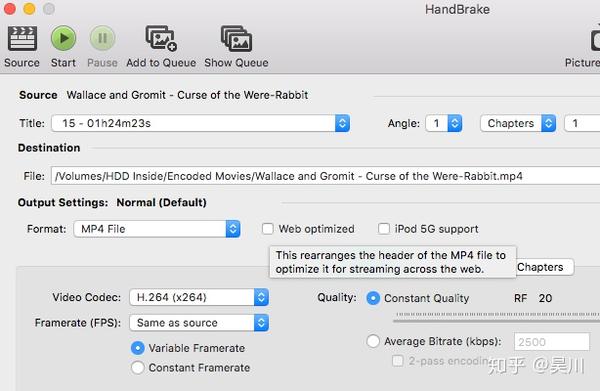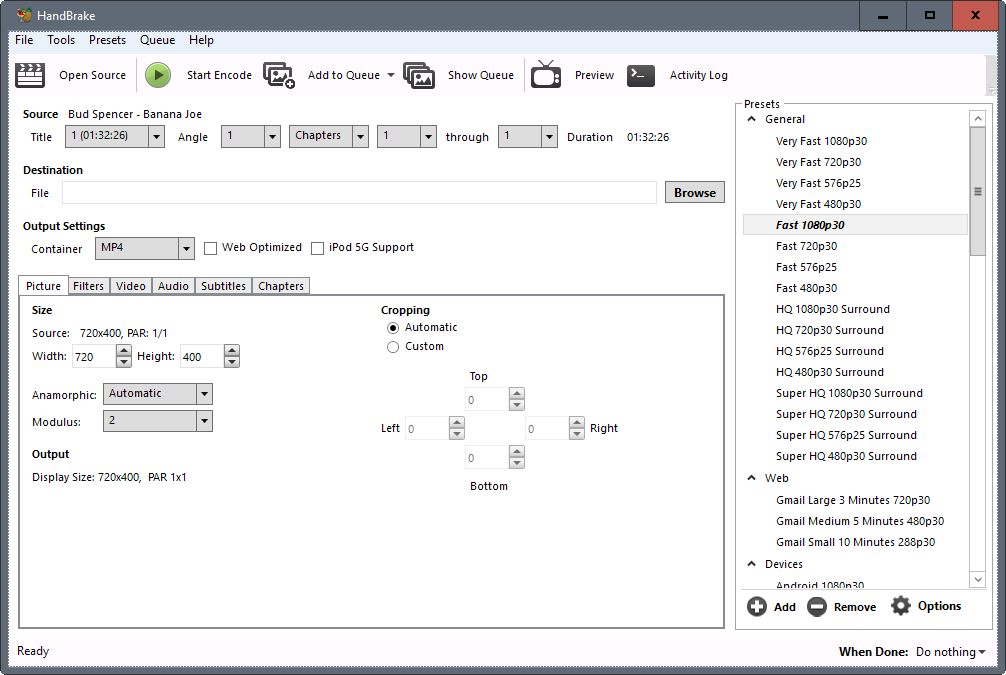

- HANDBRAKE WEB OPTIMIZED PLEX 720P
- HANDBRAKE WEB OPTIMIZED PLEX SOFTWARE
- HANDBRAKE WEB OPTIMIZED PLEX FREE

Both our network and our CPU have lighter loads to carry when we want to stream it from afar. As we noted above, results will vary based on the settings you select, but in this instance we reduced the file size by 544% and the entire video is now pre-transcoded for future viewing.
HANDBRAKE WEB OPTIMIZED PLEX 720P
In our case, the original file was a 1080p video with a file size of 8.33GB the optimized version is a 720p video with a 1.53GB file size. Once the conversion is complete, we can take a peek to see how the file size changed. So once you've ironed out what kind of settings you need for your optimization needs, this is a job best left run in the off hours. The transcoding of just this one film took approximately 20 minutes on our multi-core server. It's not as much as the original video file (because the optimization process reduces both the video quality and file size to make streaming easier), but depending on the size of your library and the video settings you select for optimization, it can add up quick.įor large files, like high bitrate HD movies, the process is slow going, even on good hardware.
HANDBRAKE WEB OPTIMIZED PLEX FREE
Now wait a minute, you might say, nothing's free but guarantees, so what's the catch? The catch is that the optimized video is stored as a separate video file with your other media and, you guessed it, takes up space. Instead, Plex's optimization will convert your media ahead of time, so when it comes time to watch the media there is no strain on the CPU-the video is already optimized and ready to send out to the client. This is different than Plex's transcoding, where it converts your video on-the-fly to the ideal format. If you experience choppy playback, regular buffering, and other similar issues, optimization can save the day. On the other hand, there are a variety of scenarios where underpowered hardware or limited internet speed can really decrease the quality of your Plex experience. If you've got great hardware and have never noticed anything amiss with your playback, this isn't the tutorial for you. If you have a good CPU (at minimum an Intel Core i3 processor or equivalent, preferably better) and a fantastic broadband connection with plenty of upload speed, then you probably don't even need to optimize your media. All the heavy lifting happens on the server side-the streaming, the transcoding of the streaming when necessary, etc.-and it is very CPU intensive.
HANDBRAKE WEB OPTIMIZED PLEX SOFTWARE
The Plex experience centers around two apps: the server (which holds your media) and the client (the app with which you watch your media, usually on your TV, your phone, or other set-top box). The central Plex Media Server software manages nearly every aspect of the Plex experience-the clients merely act as a frontend for what the server is serving up. With that in mind, we'd definitely encourage you to read over this introduction section closely to determine if you even need to optimize anything in the first place. NVENC encoding - 61 FPS (3060 Ti) - this is also very surprising, based on the test above i was expecting speeds around 300 Fps that would make it a no brainerīased on the above i doubt that CPU encoding is able to provide 6x the quality.The goal of this tutorial, taking advantage of Plex's excellent optimization features, is a godsend for those who really need it, and a total waste of time for those who don't. Does that review have any validity?Īlso, regardless of that article, is the speed vs quality tradeoff worth it? In my quick testing it looks like this: Now I understand that their test was focused on low bitrate video for streaming purposes. Now I find those chart very confusing and extremely hard to read, but as I read them the conclusion is that QSV & NVENC provide better quality than software encoding which seems to countradict everything I ever read about hardware encoding.


the possibility of getting an Intel Arc card for my server for trancoding and I have stumbled upon this article I was exploring various options and settings, incl. transcode 4 TBs of various video content with different codecs (ranging from mpegs with 320x240 resolution from around 2005 to 4k H.265 videos) to a more up to date format to save up on storage space. transcode 4K/UHD/Dolby Vision videos to 1080p/SDR x265 so I can actually watch them on my setup.


 0 kommentar(er)
0 kommentar(er)
